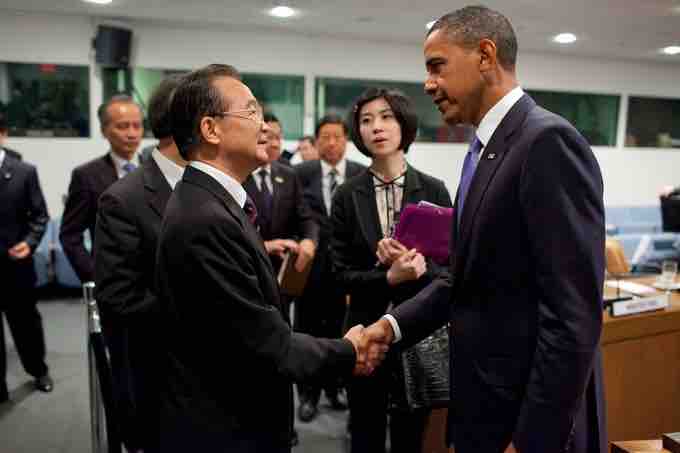The political, economic, and military rise of China, with its enormous population of more than 1.3 billion people, is a key foreign policy challenge for the United States. Within current U.S.-China relations, three issues of particular importance stand out: economic trade, the status of Taiwan, and human rights.

U.S.-China relations
President Obama and Chinese Premier Wen Jiabao
Since China and the United States resumed trade relations in 1972 and 1973, U.S. companies have entered into numerous agreements with Chinese counterparts that have established more than 20,000 equity joint ventures, contractual joint ventures, and wholly foreign-owned enterprises. The American trade deficit with China exceeded $350 billion in 2006, and is the U.S.' s largest bilateral trade deficit.
China, which became the world's second largest economy in 2010, may overtake the United States and become the world's largest economy by 2030, if current trends continue (although this growth might be limited by domestic challenges facing China, including income inequality and pollution). Among foreign nations, China holds the largest amount of U.S. public debt and has been a vocal critic of U.S. deficits and fiscal policy. In turn, the United States has criticized China's undervaluation of its currency, the Renminbi.
American support for the island of Taiwan, which China claims as one of its provinces and has threatened to take over by force, is another source of tension. The U.S. maintains sympathy for a independent Taiwan due to its liberal, pluralistic democracy, and gives Taiwan extensive political and military support. This support has resulted in threats of retaliation from China.
The Chinese government's policy toward human rights is another source of controversy. International human rights organizations have identified a number of potential violations in China, including the use of capital punishment, the application of the one child policy, the denial of independence to Tibet, the absence of a free press, the absence of an independent judiciary with due process, the absence of labor rights, and the absence of religious freedom.